The Garden: Volume Two
Uniquely Connected & Thriving Together at Dietrich College
In This Issue: A Message From Richard Scheines | Planting the Seeds: Zachary Rapaport | Sustainable Pittsburgh | Gardening Tools for Faculty | Gardeners of CMU: Anna Fisher | Events: Three Days of Community, Technology, Music and Arts, Recap: Black Male Summit, Town Hall on the Humanities | Op-Ed by Naviya Singla
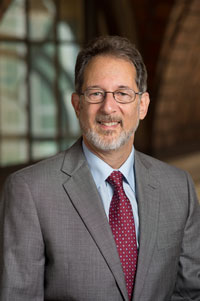 A Message From Richard Scheines
A Message From Richard Scheines
Dean, Dietrich College of Humanities and Social Sciences
This spring we aim to provide meaningful opportunities for students, faculty and staff to build and participate in the Dietrich College community. In the Garden Newsletter, we will broadcast what efforts your fellow students, faculty and staff are undertaking in the college, at CMU, and in the local community.
Although our local, national and international contexts are rife with division, one of our roles as an academic institution is to attend to these challenges by using our analytical talents to understand the causes of division so that we can act effectively to overcome them. The Garden is a place for us to embrace our differences, find ways to overcome division, and form a stronger and healthier community.
Planting the Seeds: Zachary Rapaport
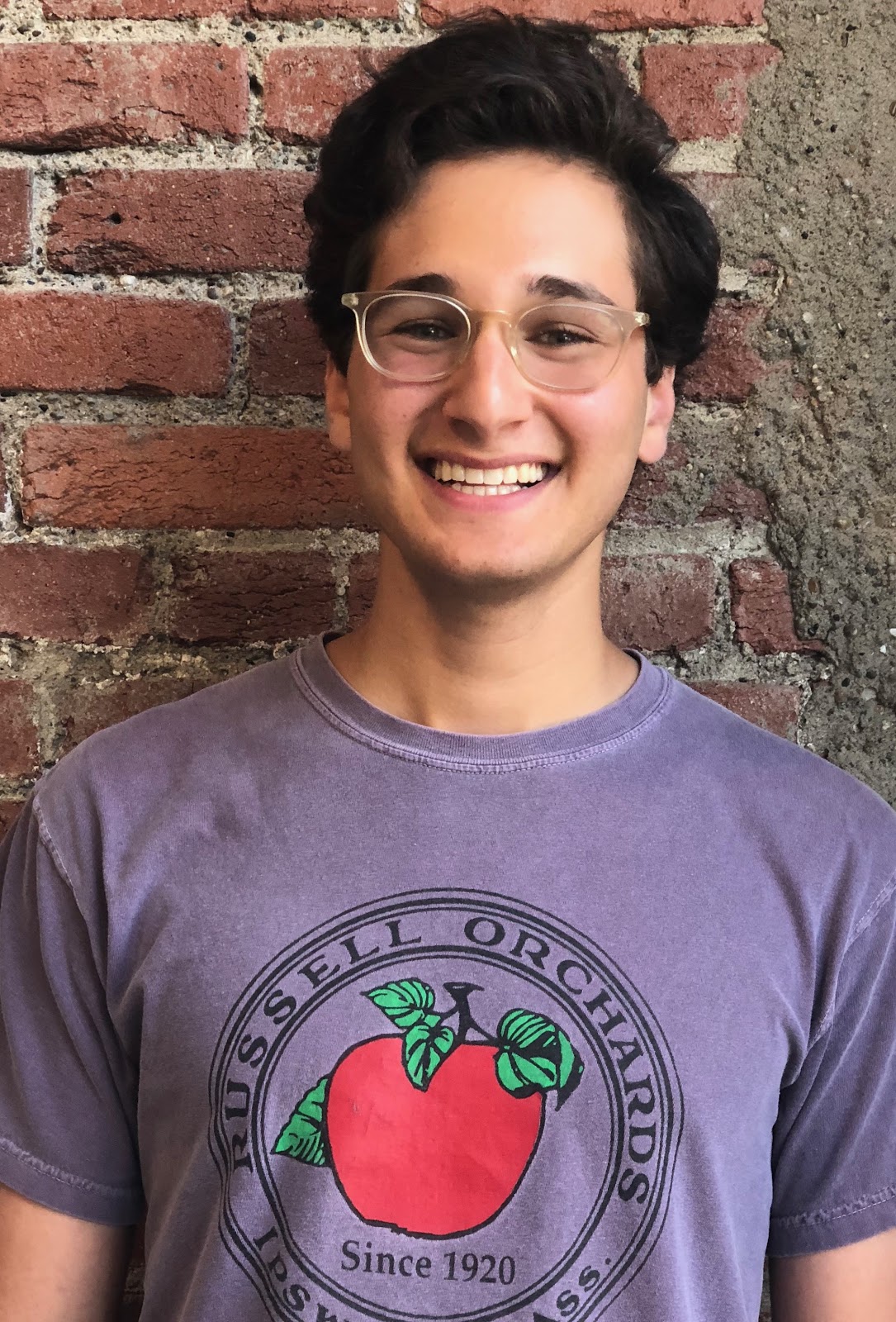 Zachary Rapaport, a junior in BXA with concentrations in Global Studies and Art and an additional major in Hispanic Studies, has used Carnegie Mellon University’s many resources to develop his interests in art and global history.
Zachary Rapaport, a junior in BXA with concentrations in Global Studies and Art and an additional major in Hispanic Studies, has used Carnegie Mellon University’s many resources to develop his interests in art and global history.
During the Fall semester, he went abroad to Mexico through a program called Mexico: Migration, Borders, and Transnational Communities under the School for International Training. This was the first year School for International Training had done this trip for over a decade, due to safety concerns regarding student protests.
The program began in Tucson, Arizona. While there, meetings with humanitarian aid groups, the Guatemalan Consulate in Tucson, and immigration attorneys contributed to students’ understanding of the politics, systems, and structures that shape migration and immigration policy in the United States. From there, they left for Oaxaca, where they continued their coursework while living with host families.
It was his first time studying abroad, and he assumed he would need to maintain the rhythm of work and daily life he was accustomed to growing up in the United States. However, he explained that the experiences he had outside the program parameters and the conversations he had in Mexico were what made his time so memorable. “I lived with two host families. One in the capital city of Oaxaca and one in the Mixteca Alta region. Although the city homestay was organized by the program, my experience in the Mixteca Alta developed more organically. Based on my interests in community-led justice movements and sustainable agriculture, the academic director of my program connected me with a friend in the Mixteca Alta. He invited me to live with his family, and off I went” Zach recalled. “I learned a lot during that time. It was short, but it was meaningful.”
Fluent in Spanish, Zach was able to speak to individuals in migrant shelters at the Mexico-Guatemala border. A lot of field trips were organized by the program, but for the last three weeks in the program, Zach got on a bus and travelled by himself to the Mixteca Alta region of Oaxaca. Zach was upfront about the questions that arose from being there. Reflecting on how he didn’t have physical, social or familial ties to the community, Zach brought up that he faced ethical dilemmas.
“Throughout my time in the Mixteca Alta, I was continuously asking myself the question of what I was doing there, in a space that was not mine. Navigating the complicated relationship between myself and the community was somewhat paralyzing at first” Zach said. “It was really from my host family that I was reassured that being there was an opportunity to learn and challenge my assumptions.”
Zach described how he posed these concerns to a friend in Oaxaca, who countered by saying, “You think that you’re leaving them with nothing, and that you’re burdening them. But it’s very likely that they don’t think that way, and you’re imposing your own viewpoint on the situation.” Zach followed up by saying, “while these experiences expanded my understanding of migration, community, and transnational identity, they are small yet complicated pieces of a much larger question. By learning from people who often go unheard, I learned to question the narrative of migration I had always been told.”
Hardest to face of all, was that he and other program participants could listen to stories of suffering and have the ability to walk away.
He plans to go back to Mexico this summer to continue some of the partnerships with organizations he developed over the fall. He is still in contact with his host family.
Sustainable Pittsburgh
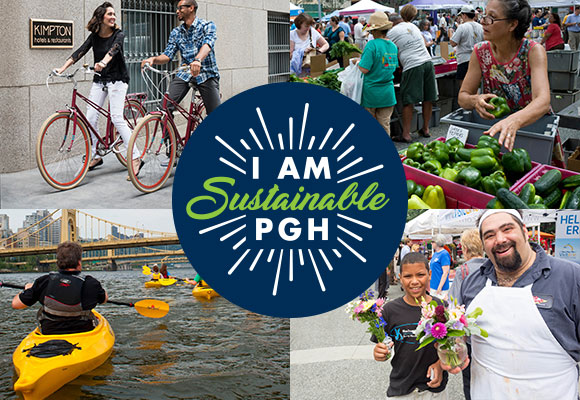 Dear Carnegie Mellon students, staff and faculty:
Dear Carnegie Mellon students, staff and faculty:
Sustainable Pittsburgh is increasingly engaging our region’s citizens in making more sustainable decisions through initiatives like our Sustainable Pittsburgh Restaurant and Sustainable Small Business Designation programs. These programs assist restaurants and small businesses in becoming more sustainable – from making operational efficiency upgrades to paying living wages – while helping consumers find and patronize businesses making strides in these areas. (Each program has a “finder” map consumers can use to locate SPRs and SSBDs in their neighborhoods.)
We’re excited to be rolling out a new program to help people adopt more sustainable lifestyles. Through the I Am Sustainable Pittsburgh competition (beginning February 27th!), people will have the opportunity to participate in a free, fun, 3-week friendly competition. Participating as individuals or as part of teams of businesses, universities, dorms, clubs, etc., each person can commit to sustainable actions of their choosing, earning points for achieving those actions. Actions range from “eat more fruits and veggies daily” and “drive less” to “sign a petition” or “avoid disposables.”
Where we could use help from CMU students, staff and faculty is in being I Am Sustainable Pittsburgh ambassadors, helping to spread word of this coming competition and encouraging friends, family and colleagues to sign up as individuals or/and form teams. Those interested can contact me at gjohnson@sustainablepittsburgh.org.
Best regards,
Gina
Gina Johnson, Director of Business Sustainability Programs
Gardening Tools for Faculty
CMU's Eberly Center for Teaching Excellence and Educational Innovation, in collaboration with Ayana Ledford, director of diversity and inclusion for Dietrich College, has designed microteaching seminars for faculty to tackle questions around how to uplift communities of learners and challenge students without motivating unhealthy competition. Each seminar is evidence-based, only 30 minutes and can be conducted at a departmental level. Topics include, “Teaching and Reaching All Students,” “Motivating Students by Promoting a Growth Mindset,” “Reducing Barriers to Achievement” and more. If these options do not appear to meet your needs, the Eberly Center is happy to visit any department meetings for a brief 10-minute Q&A to customize a session just for your team.
Gardeners of CMU: Anna Fisher
 Anna Fisher, associate professor of psychology, has for years researched how young children learn and generate knowledge. Her interest in many of the fundamental problems in education in America has led her involvement in research on learning conditions related to curriculum, instruction, and assessment that will improve academic outcomes for pre-kindergarten to postsecondary students.
Anna Fisher, associate professor of psychology, has for years researched how young children learn and generate knowledge. Her interest in many of the fundamental problems in education in America has led her involvement in research on learning conditions related to curriculum, instruction, and assessment that will improve academic outcomes for pre-kindergarten to postsecondary students.
PIER, an interdisciplinary pre-doctoral training program funded by the Institute of Education Sciences at Carnegie Mellon University, hopes to prepare a new generation of researchers to do the same. Although PIER is primarily aimed at training graduate students, PIER also began a program designed to increase the participation of underrepresented groups (including racial/ethnic minorities, first-generation college students, economically disadvantaged students, veterans, and students with disabilities) in graduate school training.
"Three years ago, we started a summer Research Experience for Undergraduates (REU) component of PIER, with a focus on providing research opportunities to students who are under-represented in graduate training programs. PIER provides funds for a stipend for each student, and departments provide funds for summer housing," Fisher said. "This year, the Psychology Department and HCII provided funds for housing, and a total of four students were funded through PIER-REU. There was a fifth student who was a PIER-REU affiliate who could not be funded by the Institute of Education Sciences because he is not a U.S. citizen. In the past, PIER-REU funded students who were close to graduation to help them learn about and prepare more competitive applications to graduate school. This year, for the first time, we admitted two freshmen into PIER-REU, and I think it was an amazing success."
This year, PIER-REU will be providing undergraduate students with 8 weeks of research apprenticeship experience during the summer, along with a fellowship stipend of $3,000 and apartment-style housing.
Events
Ready-To-Bloom: Three Days of Community, Technology, Music and Arts
Dietrich College Director of Diversity and Inclusion Ayana Ledford and Professors of English Richard Purcell and Stephen Wittek have banded together to launch TripTech, a three-day romp (March 28-30) with the Department of English, Dietrich College, and Google to discover what binds together tech and teaching, coding and culture, hip hop and hacking. The lineup includes a panel on pedagogical projects, a Q&A on teaching coding to underserved communities, and a hip hop hackathon.
Recap: Black Male Summit
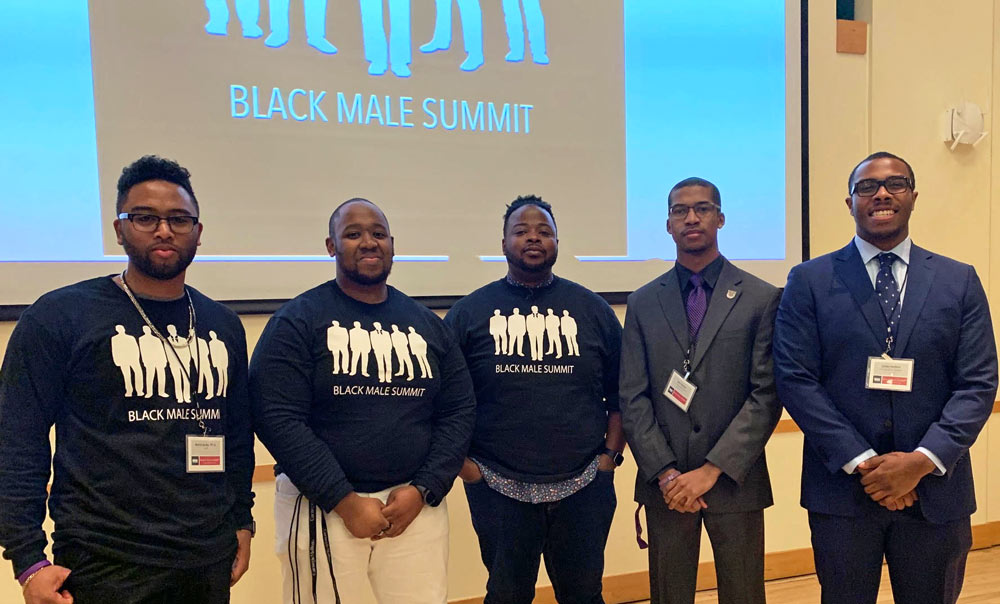
With fewer than 300 of nearly 14,000 students and barely a dozen of over 700 faculty at CMU who identify as Black men, the opportunity to engage with–let alone encounter on a siloed campus–other Black men on a regular basis is woefully limited and sorely needed. Meaningful interactions where individuals with similar backgrounds can bond over shared values and life experiences strengthens a sense of belonging and community that is needed to thrive in a potentially isolating place. One way to tell whether or not you can expect to feel like you belong in a place is seeing other individuals like you.
With the inaugural Black Male Summit at CMU on February 1-2, 2019, its organizers, the Black Male Collective (CMBMC), Stanford Becton (DC 2020), Julián Nelson (DC 2019), Rob Stephens (DC 2018), Thomas Rainey (Mudge Housefellow), and Kevin Jarbo (DC 2018), sought to bring CMU’s Black men together, foster their sense of belonging, and affirm their identities and the value of their diversity at CMU and in society more broadly.
Dr. Derrick R. Brooms, Associate Professor of Sociology at the University of Cincinnati kicked off the Black Male Summit with his keynote address “Creating Our Own Narratives: Black Men, Education, and Our Collective Efforts”. He shared stories of his own experiences in higher education emphasizing the need for Black men, and all people with marginalized and minoritized identities and backgrounds, to tell their own stories in their own voice. Dr. Brooms’s talk definitely set the tone for the rest of the weekend.
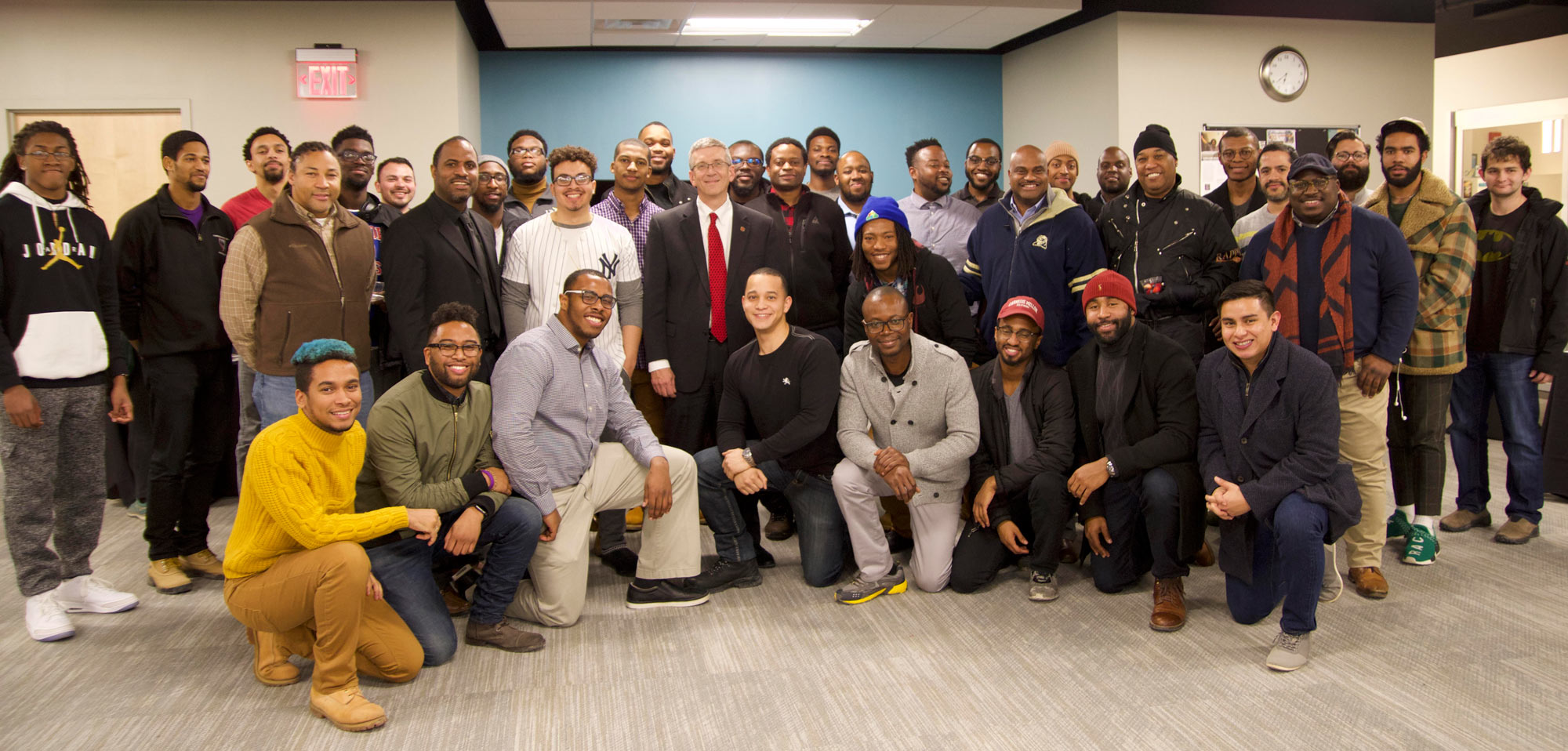
Over 200 CMU students, staff, faculty, and several members of university leadership came together in solidarity in a space where Black men across the entire university spoke candidly about their personal experiences at CMU during multiple workshops and a panel discussion. CMU students and staff led workshops covering several topics tailored to the Black male experience, including: Black Masculinity 101 by Rob Stephens and Mecca Parker (CIT 2020), Black Men and #MeToo by Thomas Rainey, and Black Male Sense of Belonging by Dr. Kevin Jarbo. Clinicians Dr. Walter Smith Jr. and Darrell Phillips, LCSW facilitated workshops on Black MENtal Health. Also, Kameron Bradley (CIT 2019), Malik Parker (CIT 2018), Officer Leon Mickens III, and Dr. Jimmy Williams (CIT) served as panelists for the discussion topic: “Being a Black Man Is Enough”. Many attendees noted a shift in their personal perspectives of the Black male experience and challenged themselves to continue to grow and apply what they learned after a full day of reflective intergroup dialogue.
The CMBMC is eyeing February 7-8, 2020 for next year’s summit. In addition to the marquee event, the CMBMC has been holding a weekly writing accountability group called Writer’s Block every Thursday this semester in the Cohon University Center and plans to expand their efforts into a full initiative that promotes the academic success and personal development of all Black men at CMU.
You can follow the CMBMC on Facebook or join their CMBMC-all email list. To help organize next year’s summit or other CMBMC events, email Kevin Jarbo at kjarbo@cmu.edu.
Sprouting Opportunities: Town Hall on the Humanities
Although research and education in the humanities at CMU is thriving and strong, it can occasionally get drowned out by CMU’s large presence in STEM. In order to highlight exciting ongoing work, present new initiatives, and discuss how we might proceed in the future, Dietrich College will hold a town hall on the humanities at Carnegie Mellon at 4:30 p.m. on April 10. Dean Scheines invites all interested students, faculty, and staff to attend and participate in the discussion.
Op-Ed by Naviya Singla
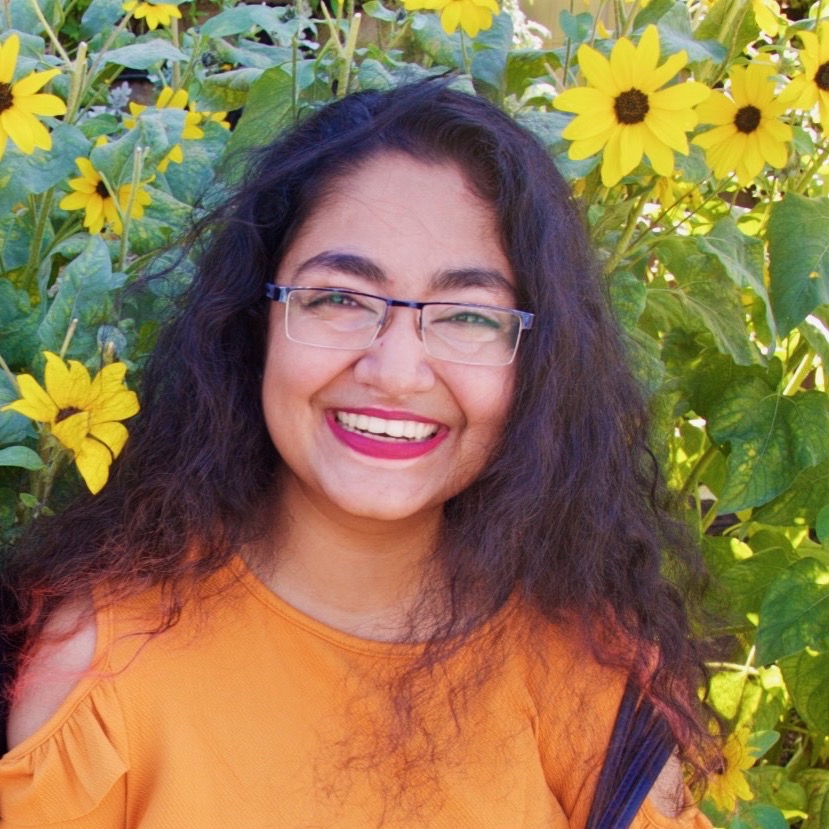 The US is home to a sizeable group of over 1.1 million international students. Yet, that demographic is often accused of being apolitical and apathetic to the issues of the country they chose to study in, at other higher education institutions as well as CMU. One might argue that CMU students are busy so the political silence is a reluctance to spend time on things that aren’t the “real reason” for being here, especially for international students paying full tuition to study on this campus. Yet other reasons for the international students’ reticence might be key to understanding the political climate (and how to shape it) at CMU.
The US is home to a sizeable group of over 1.1 million international students. Yet, that demographic is often accused of being apolitical and apathetic to the issues of the country they chose to study in, at other higher education institutions as well as CMU. One might argue that CMU students are busy so the political silence is a reluctance to spend time on things that aren’t the “real reason” for being here, especially for international students paying full tuition to study on this campus. Yet other reasons for the international students’ reticence might be key to understanding the political climate (and how to shape it) at CMU.
One reason for an international student’s political silence is the current administration's attitude towards immigrants, which makes it harder for international students to get visas both before joining a university (student visas) and after graduating (work visas), thus making a seemingly “spotless” conduct necessary. Furthermore, students from certain countries can also face severe repercussions if their opinions are reported back. Coupled with a lack of knowledge of their legal rights and ways to handle repercussions from potential backlashes, it is not always clear if voicing one’s political opinion is an option. The international students’ political silence might also result from their disillusionment with their home country and the US.
With 23% of the undergraduate population at CMU being international, it is necessary to seek that missing voice in trying to foster a political community at CMU. After all, the international students’ voices belong to those who might be affected by the current US political climate, who might feel left out, and who might bring perspectives to this larger conversation.
Naviya Singla is a senior studying Computer Science and Creative Writing.